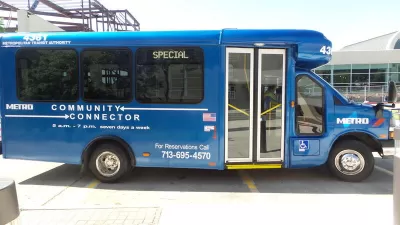Transit ridership has been waning in Charlottesville, Virginia, but a regional system could benefit the area’s operators and better meet the mobility needs of riders.

A regional transit system in Charlottesville, Virginia, could be the solution to the area's mobility challenges, including a drop in ridership on the Charlottesville Area Transit system of more than 25 percent in the last five years.
"By [CAT director Garland] Williams' own admission the current system is failing riders due to unreliability, decreasing coverage, and one-way routes that serve CAT better than they do its customers," writes Wyatt Gordon.
The Jefferson Area Regional Transit Partnership Expansion is an advisory body exploring expansion through establishment of a regional transit authority. An authority would bring together the three transit operations in the area: CAT, University of Virginia’s student shuttle, and JAUNT, a microtransit service for regional commuters.
"If the three are able to stitch together their services under one umbrella as a regional transit authority that could unlock new state and federal funding that none are eligible for on their own," notes Gordon.
The Charlottesville area is facing increased housing costs, congestion, and pollution, making improved mobility a policy priority. "With sprawl on the rise and more locals driving to work from far-flung counties, it makes sense that the region is seeing a renewed push for transit—and may be willing to pay for it," adds Gordon.
FULL STORY: Could regional expansion solve Charlottesville, Virginia’s transit “death spiral?”

Alabama: Trump Terminates Settlements for Black Communities Harmed By Raw Sewage
Trump deemed the landmark civil rights agreement “illegal DEI and environmental justice policy.”

Study: Maui’s Plan to Convert Vacation Rentals to Long-Term Housing Could Cause Nearly $1 Billion Economic Loss
The plan would reduce visitor accommodation by 25% resulting in 1,900 jobs lost.

Planetizen Federal Action Tracker
A weekly monitor of how Trump’s orders and actions are impacting planners and planning in America.

Wind Energy on the Rise Despite Federal Policy Reversal
The Trump administration is revoking federal support for renewable energy, but demand for new projects continues unabated.

Passengers Flock to Caltrain After Electrification
The new electric trains are running faster and more reliably, leading to strong ridership growth on the Bay Area rail system.

Texas Churches Rally Behind ‘Yes in God’s Back Yard’ Legislation
Religious leaders want the state to reduce zoning regulations to streamline leasing church-owned land to housing developers.
Urban Design for Planners 1: Software Tools
This six-course series explores essential urban design concepts using open source software and equips planners with the tools they need to participate fully in the urban design process.
Planning for Universal Design
Learn the tools for implementing Universal Design in planning regulations.
Caltrans
Smith Gee Studio
Institute for Housing and Urban Development Studies (IHS)
City of Grandview
Harvard GSD Executive Education
Toledo-Lucas County Plan Commissions
Salt Lake City
NYU Wagner Graduate School of Public Service




























